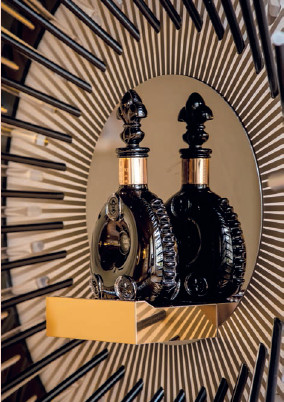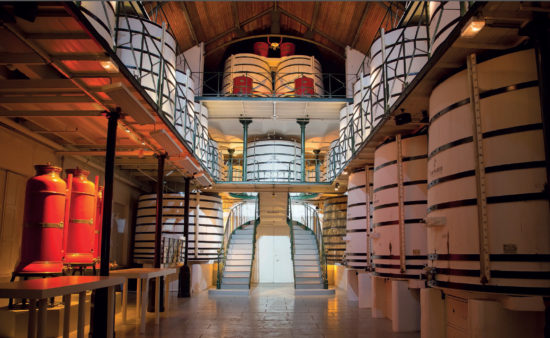Published: Monday August 15 2016With almost 300 years of history, Rémy Martin is one of the world’s leading cognacs, selling 24 million bottles a year to consumers in Europe, North America and Asia. In 1990–91, it joined forces with a much younger premium spirit — the orange-flavoured liqueur first sold by the Cointreau brothers in 1875. The merged Rémy Cointreau group also owns a range of other spirits, including Mount Gay rum, Metaxa brandy and Bruichladdich Scotch whisky.Rémy Martin dates back to 1724 when a young winegrower of the same name started selling cognac. It was quickly recognised for its excellence by King Louis XV who in 1738 granted Martin the rare right to plant new vines in the Cognac region. It is classed as a Fine Champagne cognac because it comes exclusively from two Cognac districts with the very chalky soil that produces the best eaux-de-vie — the Premier Cru Grande Champagne and the Petite Champagne cru.Over the years, Rémy Martin expanded inter-nationally, exporting to North America and then Asia. And according to Marie-Amélie Jacquet, a fourth generation member of the Hériard Dubreuil family which first took control of Rémy Martin in 1924, it soon became very popular in Asia.‘Our Louis XIII cognac, which was first bottled in 1874, had reached Penang, Calcutta and Shanghai by 1881 and was much enjoyed by the Chinese.
Topics:
Perspectives Pictet considers the following as important: Family businesses, family enterpreneurs, heritage brands, In Conversation With
This could be interesting, too:
Perspectives Pictet writes House View, October 2020
Perspectives Pictet writes Weekly View – Reality check
Perspectives Pictet writes Exceptional Swiss hospitality and haute cuisine
Jessica Martin writes On the ground in over 80 countries – neutral, impartial and independent
With almost 300 years of history, Rémy Martin is one of the world’s leading cognacs, selling 24 million bottles a year to consumers in Europe, North America and Asia. In 1990–91, it joined forces with a much younger premium spirit — the orange-flavoured liqueur first sold by the Cointreau brothers in 1875. The merged Rémy Cointreau group also owns a range of other spirits, including Mount Gay rum, Metaxa brandy and Bruichladdich Scotch whisky.
Rémy Martin dates back to 1724 when a young winegrower of the same name started selling cognac. It was quickly recognised for its excellence by King Louis XV who in 1738 granted Martin the rare right to plant new vines in the Cognac region. It is classed as a Fine Champagne cognac because it comes exclusively from two Cognac districts with the very chalky soil that produces the best eaux-de-vie — the Premier Cru Grande Champagne and the Petite Champagne cru.
Over the years, Rémy Martin expanded inter-nationally, exporting to North America and then Asia. And according to Marie-Amélie Jacquet, a fourth generation member of the Hériard Dubreuil family which first took control of Rémy Martin in 1924, it soon became very popular in Asia.

‘Our Louis XIII cognac, which was first bottled in 1874, had reached Penang, Calcutta and Shanghai by 1881 and was much enjoyed by the Chinese. Much later, my grandfather travelled there a lot, introducing cognac to more people. And in 1980, we formed one of the West’s first joint ventures with the Chinese in the port of Tianjin.’
Caring about the business
Marie-Amélie never intended to join the family business — and nor did any of her eleven cousins. ‘We always wanted to do our own thing, and were successful in our chosen professions. But about ten years ago, our parents asked us whether we cared about the business, and what we wanted to do about it. We said that we did care and would like to know more about the company and the governing body.
‘One cousin joined the board, while I and four others became involved in operational activities. Quite a few of my cousins are still outside the business — one is a journalist, another a lawyer and one is even a milliner — and those who have joined the company have also followed a variety of professions.’
Her first roles with Rémy Cointreau were in finance at its Paris headquarters and in the family’s holding company. This was a natural choice for someone who had worked for more than seven years as an investment banker in London, specialising in mergers and acquisitions. ‘I had some trepidation about how I would be received as a family member, but I was very pleasantly surprised by the way people welcomed me to the company.
‘I was already very proud of the company, its history and its products which bring a lot of joy and benefits to people — and not just of the liquid kind! But I also learnt about our family’s involvement, and how they fulfil their duty of care to the shareholders and the group’s staff. Some of those who work for Rémy Martin in Cognac are from families which were doing so before our family became involved, and I have been impressed at how deeply they care about the business.’
In 2013, she moved to Singapore where she is a financial planning and analysis manager for the Asia-Pacific region. Although the group headquarters is in Paris, the regions have considerable control over their sales, working in each market alongside distributors with whom the company has had long-standing relationships. She is also involved in the region’s duty-free operations, which has allowed her to gain a wider under-standing of marketing in a sector where she previously had no experience.
Global growth in spirits sales has faltered recently, particularly in China where drinks companies have been hit by the new anti- corruption rules. But consumption of premium products such as those owned by Rémy Cointreau continues to rise around the world as drinkers trade up from local brands to imported spirits. And there has been sustained growth in the US market recently, aided by the success of the group’s strategy of moving upmarket and abandoning low-end products.
With annual sales of around EUR1 billion and operating profit of more than EUR150 million, Rémy Cointreau and its 1,800 employees sustain a market capitalisation of EUR3.3 billion. Thanks to the group’s global diversification, a fall in sales in Europe, North America or Asia is likely to be matched by a rise in one of the other two regions. Meanwhile, duty-free sales of premium spirits have been surging over the last decade, as international travel by tourists from emerging markets such as China increases steeply.
The group’s brands are enjoyed by a wide variety of consumers at home, in bars and restaurants, and as an ingredient for cocktails such as the Sidecar and the White Lady. ‘Marketing spirits often involves tasting sessions for drinkers,’ says Marie-Amélie, ‘which is the best way to show them how enjoyable our brands can be. We also work with bartenders and other influencers who can introduce their customers to Rémy Martin and Cointreau.’

Acquisitions of non-cognac brands have added to the group’s product range. As well as Cointreau, they include Metaxa, the Greek brandy which many tourists acquire a taste for on holiday, and Mount Gay from Barbados — the oldest rum company in the world. The latest addition is Bruichladdich, a distillery business on Scotland’s island of Islay which produces three high-end malt whiskies and the only Islay dry gin. The group also distributes some other companies’ brands such as Russian Standard vodka.
While the firm is listed, the family controls over half the shares
Although Rémy Cointreau is listed on the Paris stock exchange, the family controls more than half the shares — so the Chairman is one of Marie-Amélie’s uncles, and her mother and other family members sit on the board. However, the Chief Executive has not been a family member for more than ten years and the brands are all produced independently by their own managers to maintain their identities. ‘We have a clear understanding of the role of professional management and our role,’ says Marie-Amélie.
‘There are quite a few third and fourth generation members involved around the world. And the family involvement with the group looks secure, with the fifth generation already numbering 18 and counting. We spend a lot of time discussing governance, finding ways to talk together so that we can speak with one voice. It’s a lot of work, but we all get along together — which is not always the case with large family businesses.’
She says that she will probably return to work with the group in France at some time. ‘I am not done yet with understanding the company, so I hope I can find another job in the business or around it. I definitely want to be involved with the group for the foreseeable future!’
